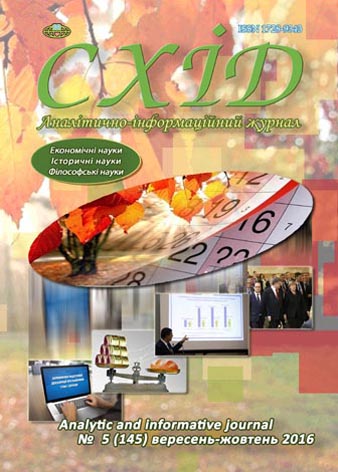Language in the relevant cultural space: the comparative analysis of conceptions of L. Wittgenstein and J. Derrida
DOI:
https://doi.org/10.21847/1728-9343.2016.5(145).79210Keywords:
deconstruction, analytic philosophy, logocentrism, grand narratives, overcoming metaphysics, self-evidence, pattern, L. Wittgenstein, J. DerridaAbstract
The executed study focuses its attention on the phenomenon of the language as the legitimation factor of cultural narratives and the space of metaphysics bases creation as the Western way of thinking grandnarrative. It scrutinizes the language role and status in the works by L. Wittgenstein and J. Derrida whose worldview systems differ greatly from the preceding metaphysic tradition and simultaneously preserve and inherit the classical principles of philosophizing. It has been proved that both philosophers have closeness of views in the matter of Western Philosophy genesis. The article emphasizes that L. Wittgenstein and J. Derrida have the same object of cognition, which is the postulate that there exist inviolable universals in a language structure: general rationalistic principles on the bases of which the whole system of Western Metaphysics is created. It has been demonstrated that within deconstructionism, as well as within L. Wittgenstein philosophy, different ways are used to confirm a language role as the specific instrument for expressing senses, which in the process of reality acquisition forwards semantic violence over it. The author considers that the main objective of the publication is to demonstrate the critical direction of the two conceptions concerning the language nature as the actual space for cultural narratives formation and the centerpiece for the creation of main metaphysical Western way of thinking senses. L. Wittgenstein and J. Derrida experience has great potential for understanding and solving contemporary humanitaristics key transformational problems. The article states that the tradition of own principles "revision", characteristic of the ХХ century philosophy, has different worldview grounds in different conceptions. But their common item is the recognition of the fact that these general universal principles are rooted, in the best part, in a language as a social way of thinking abstract model. In point of fact, in deconstructionism we deal not with basic ideas borrowings in a creative search of overcoming metaphysics, but with the so-called emanation of senses. At the advanced historical stage this phenomenon of emanation includes the actual experience of "overcoming" in the traditions set up by M. Heidegger, R. Karnap, L. Wittgenstein and acquires its utmost presentation in the works by J. Derrida.
Downloads
References
Staten, H. (1984), Wittgenstein and Derrida, University of Nebraska Press, Lincoln, 182 p.
Gasché, R. (1986), The Tain of the Mirror. Derrida and the Philosophy of Reflection, Mass., Harvard University Press, Cambridge, 348 p.
Ralph, E. Shain(2007), Derrida and Wittgenstein: Points of Opposition, Journal of French Philosophy, Vol. 17, Number 2, pp.130-152. doi: 10.5195/jffp.2007.217
Garver, N. and Lee, S.C.(1994), Derrida & Wittgenstein, Temple University Press, Philadelphia, 242 p.
Margolis, J. (1994), Vs. (Wittgenstein, Derrida), in Wittgenstein and Contemporary Philosophy, edited by Souren Teghrarian, Thoemmes Press, Bristol, рр. 161-184.
Mulhall, S. (2000), Wittgenstein and Deconstruction, Ratio, Vol. 13, 407-418. doi: 10.1111/1467-9329.00138
Norris, C. (1998), Deconstruction, postmodernism and philosophy of science: Some Epistemo - critical bearings, Cultural Values, Vol. 2, Issue 1, 18-50. doi: 10.1080/14797589809359286
Wolfreys, J. (1998), Deconstruction Derrida, St. Martin’s Press, New York, Vol. XIV, 240 p. doi: 10.1007/978-1-349-26618-0
Gryaznov, A.F. (1996), The phenomenon of analytic philosophy in the Western culture of the twentieth century, Problems of philosophy, Vol. 4, pp. 37-47 (rus).
Wittgenstein, L. (1994), Philosophical Investigations, Ludwig Wittgenstein’s philosophical work. Part 1, Gnosis, Moscow, pp. 75-319 (rus).
Wittgenstein, L. (1994), On Certainty, Ludwig Wittgenstein’s philosophical work. Part 1, Gnosis, Moscow, pp. 321-406 (rus).
Zayichenko, G.А. Postmodernism: key ideas of L. Wittgenstein and J.Derrida, Philosophical and sociological thought, Vol. 4, pp. 45-60 (rus).
Gurko, E.N. (1999), Power and signification (“Force et signification”): the structuralist obsession, Gurko E. Texts of deconstruction, Vodoley, Tomsk, pp. 35-49 (rus).
Lukyanets, V.S., Sobol, O.M. (1998), Postmodern Philosophy, Abris, Kyiv, 352 p. (ukr).
Derrida, J. (1996), Position, Interview with Jean-Louis Udbin and Guy Scarpetta, DL, Kiev, pp. 65-172 (rus).
Derrida, J. (2007), Dissemination, U-Faktoriya, Ekaterinburg, 608 p. (rus).
Wittgenstein, L. (1994), Tractatus Logico-Philosophicus, Ludwig Wittgenstein’s philosophical work. Part 1, Gnosis, Moscow, pp. 1-75 (rus).
Shtegmayer, V. (1999), Deconstruction and Hermeneutics. Discussion on the delimitation, Hermeneutics and deconstruction, St. Petersburg State University, St. Petersburg, pp. 4-9 (rus).
Lanin, D.A. (1999), Wittgenstein and the question of the reality of the language, Metaphysical studies. Almanac Laboratory of Metaphysical Studies at the Philosophical Faculty of St. Petersburg University, Aletheia Publishing House, St. Petersburg, Vol. 11, pp. 46-58 (rus).
Heidegger, M. (1993), Overcoming metaphysics, Time and Being: Articles and speeches, The Republic, Moscow, pp. 177-192 (rus).
Carnap, R. (1998), Overcoming metaphysics the logical analysis of language, Analytical Philosophy: Formation and development (anthology), Intellectual House of Books, Progress-Tradition, Moscow, pp. 69-89 (rus).
Downloads
Published
How to Cite
Issue
Section
License
Copyright (c) 2016 Ganna Stoyatska

This work is licensed under a Creative Commons Attribution-NonCommercial-NoDerivatives 4.0 International License.
1. Authors bear responsibility for the accuracy of facts, quotations, numbers and names used.
2. Manuscripts are not sent back.
3. The publisher does not always agree with the authors' opinion.
4. The authors reserve the right to authorship of the work and pass the first publication right of this work to the journal under the terms of a Creative Commons Attribution-NonCommercial-NoDerivatives 4.0 International License. This license allows others to distribute (copy) the published work for non-commercial purposes, provided there is mandatory attribution to its authors and a link to the first publication in our journal.
5. The authors have the right to conclude separate supplement agreements that relate to non-exclusive work distribution in the form in which it has been published by the journal (for example, to upload the work to the online storage of the journal or publish it as part of a monograph), provided that the reference to the first publication of the work in this journal is included.

